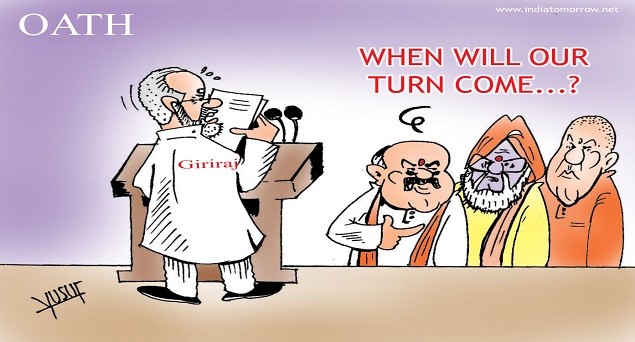Editorial
There is rise in communal violence in western UP with the increasing population of a particular community, BJP MP Yogi Adityanath told voters in Noida in September ahead of the state assembly by-polls and then went on to dare the state government to arrest him.
In a run up to the general elections in May, BJP leader Amit Shah had said in Uttar Pradesh: “This election is about voting out the government that protects and gives compensation to those who killed Jats. It is about badla (revenge) and protecting izzat (honour).” He was apparently invoking the Hindus to take revenge from Muslims for the Muzaffarnagar riots of 2013.
Now launching the BJP election campaign on Dec 1 in Delhi, union minister Sadhvi Niranjan Jyoti, MP from Uttar Pradesh’s Fatehpur asked voters to choose between ‘Ramzadon’ (those born of Ram) and ‘haramzadon’ (illegitimately born).
Prime Minister Narendra Modi’s Independence Day address to the nation was just perfect. “Even after independence we sometimes face the poison of casteism or communalism. How long will it continue and who is going to benefit from it? I appeal to the youth of the country that the poison of casteism, communalism or sectarianism is a hindrance to our country’s progress. Think and try a ten years moratorium to get a society free of all these tensions.”
Why should not the nation believe that Modi and Adityanath plus Sadhvi Niranjan Jyoti plus Amit Shah represent two sides of the same BJP coin? Amit Shah, Sadhvi Niranjan, Sakshi Mahraj and Adityanath pampering the ego and pride of the Hindutva constituency ahead of every election, while Modi posing as the development man and the darling of the middle class.
The people of the country want an answer to this: How long will this duplicity in public posturing go?
The opposition has rightly stepped up attack on the government asking the prime minister “Modi jawab do” for the simple reason that why such a minister has not been fired from office.
Bharatiya Janata Party (BJP) MP from Unnao Swami Sakshi Maharaj had in September in Kannuaj in Uttar Pradesh described Islamic seminaries or madrassas as “hubs of terror and jihadis.” “To teach students only about Quran and turn them into terrorists and jihadis is not in the best interests of the nation,” he had alleged.
The BJP earlier in October had tried to introduce right wing agendas into the politics of Uttar Pradesh which in the May general election had sent 73 MPs belonging to the saffron alliance in the state. On top of Yogi Adityanath’s agenda was illegal cow slaughter, forced conversions and illegal infiltration by Bangladesh. The BJP had simultaneously fanned the issue of Love Jihad in the western Uttar Pradesh region to spoil the social capital between the Jats and Muslims who had enjoyed harmonious relations for centuries.
The BJP was forced to drop the three controversial agendas after the formation of NDA government like Ram Janambhumi-Babri Masjid issue, Article 370 and uniform civil code. At the same time some leaders continued to talk about these issues and the party kept in its own agenda but whenever a controversy erupted over the issues the leadership quickly condoned it rejecting them as individual opinion. Now with the brute majority that it has in the house the Modi led BJP does not need its alliance partners rather it is vice versa.
The BJP has a history of double speak. Lal Krishna Advani pampered the Hindutva agenda and soothed the right wing sentiments while former prime minister Atal Bihari Vajpayee always remained the moderate face. It was fine for the public to accept Vajpayee as a moderate face despite KN Govindacharya describing him as “mask” because the veteran politician’s personality always had a soothing impact on the image of the saffron party due to his apparent aversions to right wing politics. He was called a “right man in the wrong party” but it would be extremely difficult to give this kind of benefit of doubt to former Gujarat chief minister Narendra Modi for various reasons including his controversial speech of “Hum Paanch Hamare Pachees” ahead of the 2002 assembly elections of Gujarat.





